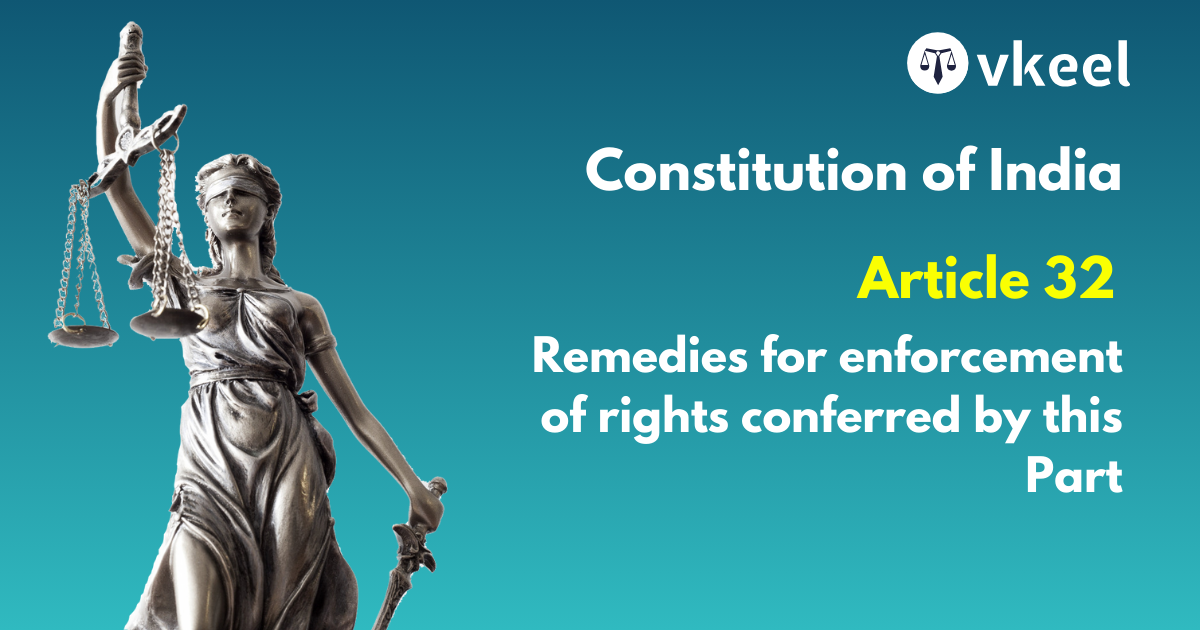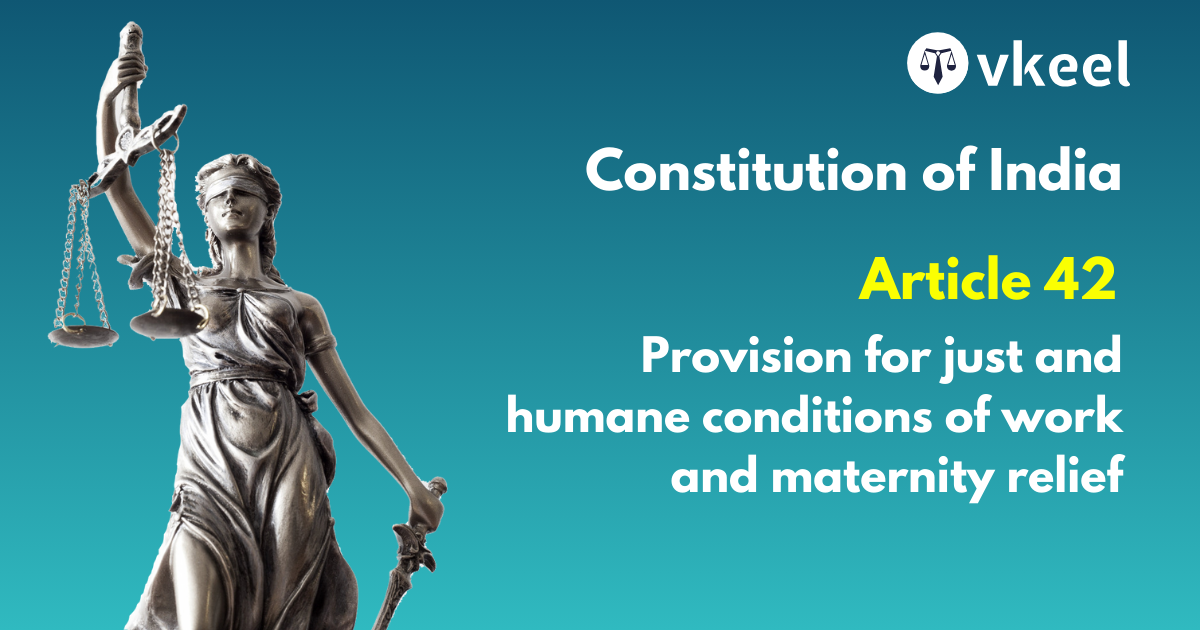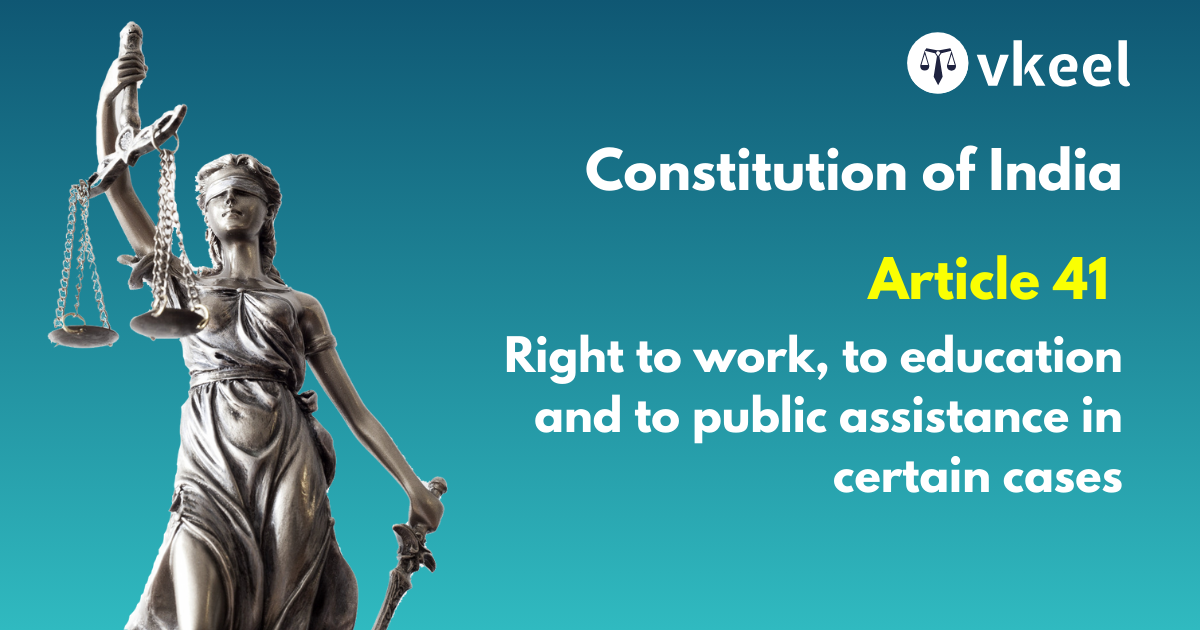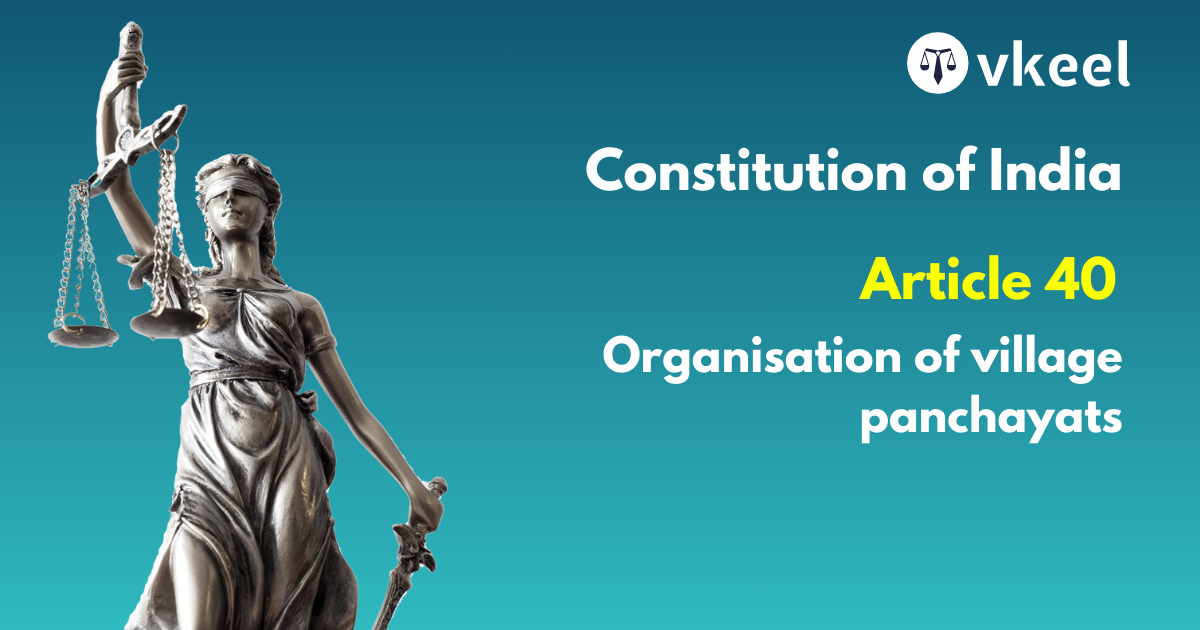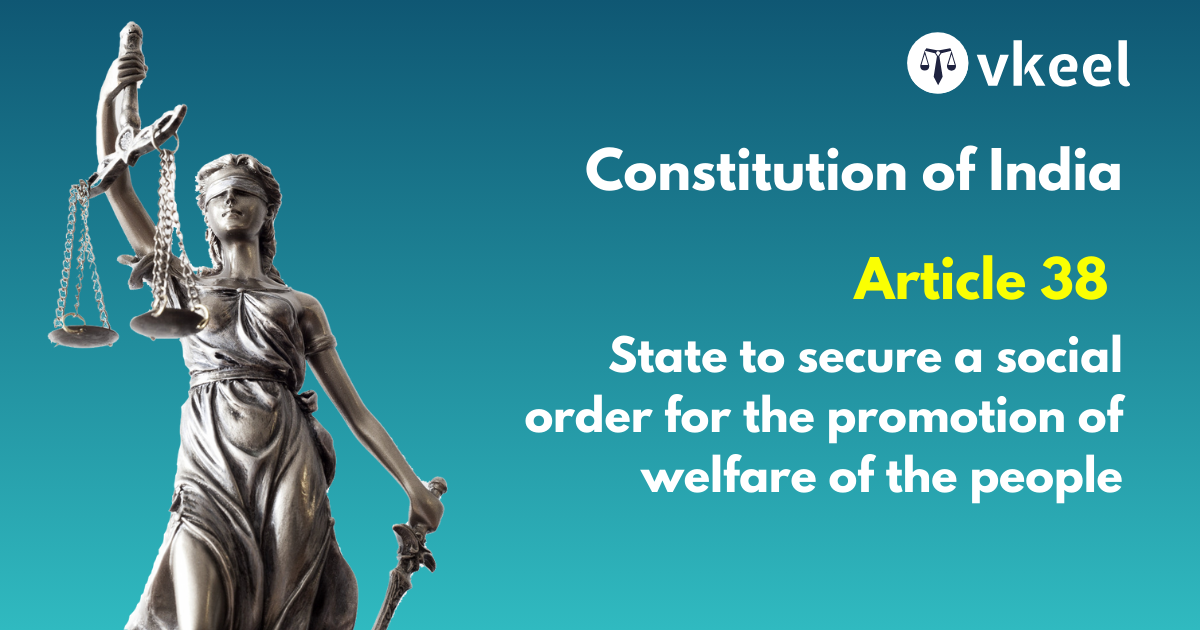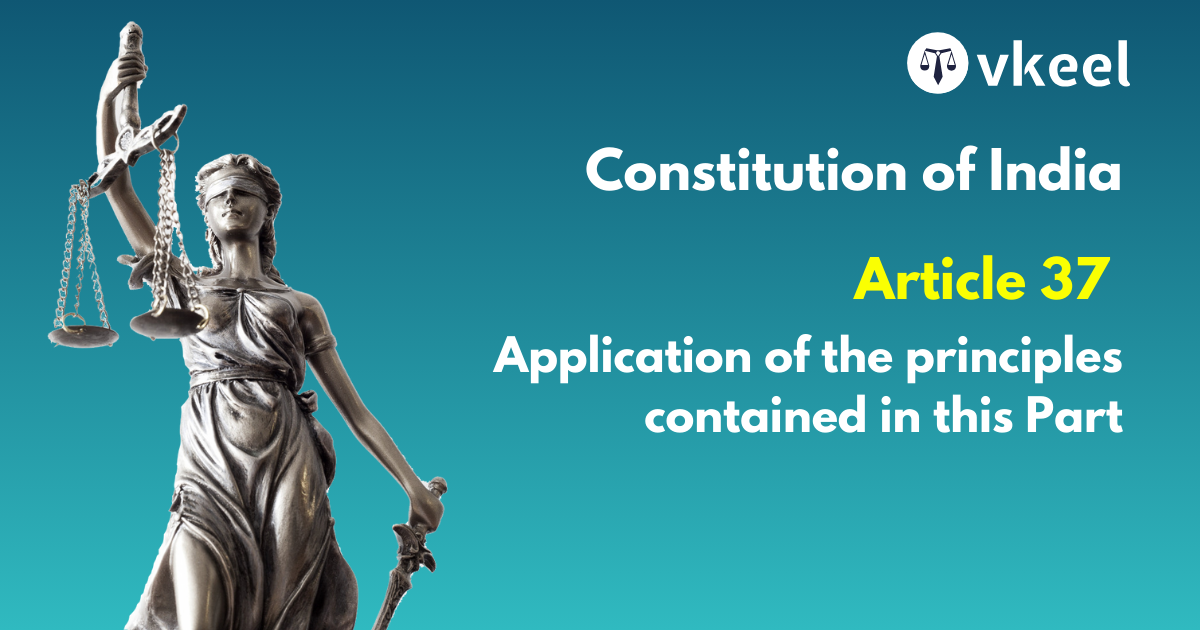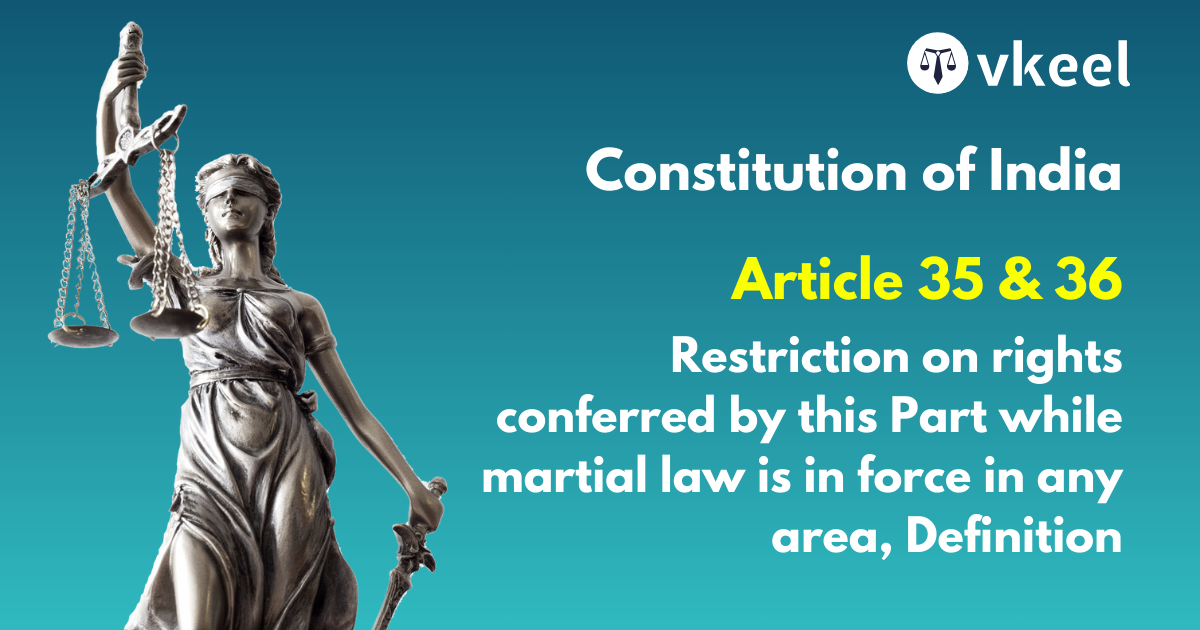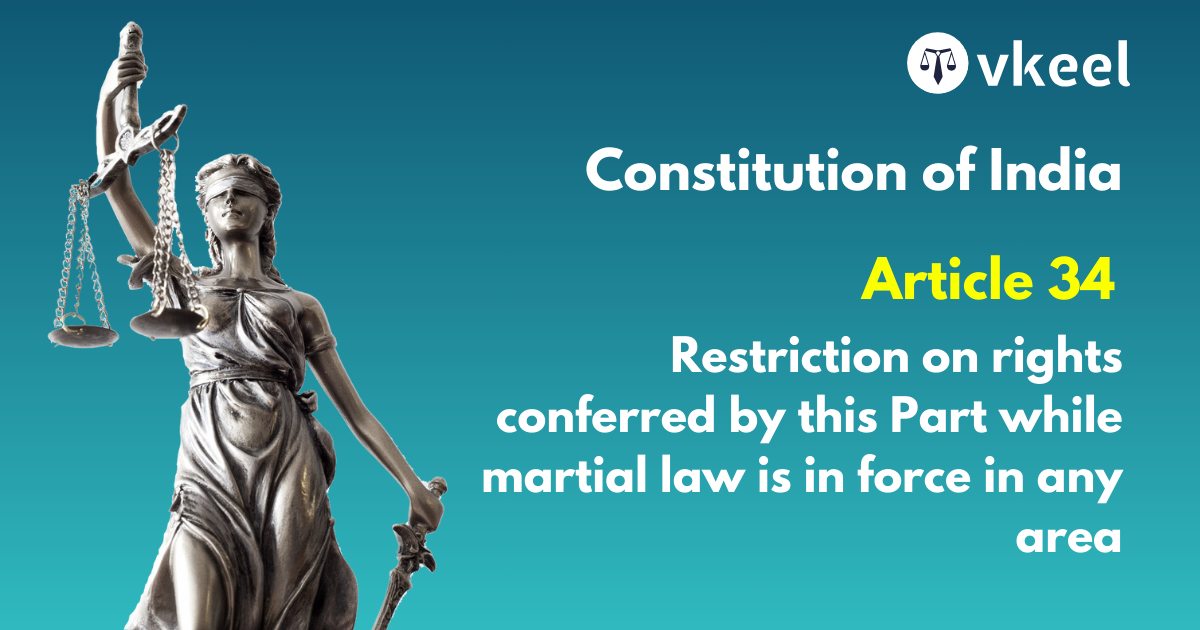Article 32 of the Constitution of India
By Joy Puri
Introduction
The Article 32 of the Constitution of India is also termed by the legal masters as the “Right to Constitutional Remedies”.
Article 32 of the Constitution of India is observed as a fundamental right wherein the citizens can approach the Hon’ble Supreme Court of India if their respective fundamental rights are breached.
The Article 32 of the Constitution of India thereby provides a legal path to the one who has been aggrieved and thereafter to enforce their fundamental rights.
Article 32 of the Constitution of India
Remedies for enforcement of rights conferred by this Part
(1) The right to move the Supreme Court by appropriate proceedings for the enforcement of the rights conferred by this Part is guaranteed.
(2) The Supreme Court shall have power to issue directions or orders or writs, including writs in the nature of habeas corpus, mandamus, prohibition, quo warrant and certiorari, whichever may be appropriate, for the enforcement of any of the rights conferred by this Part.
(3) Without prejudice to the powers conferred on the Supreme Court by clauses (1) and (2), Parliament may by law empower any other court to exercise within the local limits of its jurisdiction ill or any of the powers exercisable by the Supreme Court under clause (2).
(4) The right guaranteed by this article shall not be suspended except as otherwise provided for by this Constitution.
What are Writs?
Writs are present in the Article 32 of the Constitution of India. The certain kind of writs are present to the aggrieved wherein the fundamental rights of the person are breached. The aggrieved via the route of Article 32 of the Constitution of India can approach the Hon’ble Supreme Court of India.
But the real question arises that how do we define a writ? Are they certain kinds of powers conferred to the citizens of India?
To boot up, the writs are referred to the distinctive legal instruments or the tools which are available to the people of India. The writs in the country, play a significant role in protecting the fundamental rights of the Indian citizens.
It refers to the formal order of the respective authority that is, the court of law. Herein the courts which can be approached via writs are the courts which possess appellate jurisdiction. Which means the High Courts and the Supreme Court of India.
Types of Writs
Habeas Corpus
The writ of Habeas Corpus means to present the body before the respective authority. The basic objective of the writ is that the unlawful detention or imprisonment of the innocent doesn’t take place.
In this sort of writ the court directs the authority holding the detained person, to present the respective person in order to justify his detention.
Mandamus
The writ of mandamus is issued by the respective court wherein the authorities have failed to fulfill their duties which they are entitled to perform but have not. The basic crux of the writ is that the authorities fulfill their duties which exist within their ambit.
Prohibition
The writ of Prohibition is issued by the Higher court to the subordinate court or any court lesser in hierarchy whereby it ordains the command to stop the proceedings in a case that exceeds the jurisdiction.
The main crux behind the writ of prohibition is that it helps to prevent the lower courts from exceeding their jurisdiction illegally.
Certiorari
The writ of certiorari presents that orders a lower court to transfer a case to a higher court for review, typically used to quash illegal decisions.
The translation of certiorari is to be certified. The sole reason behind the writ is that it prevents the errors of the law and jurisdiction by the lower courts
Quo Warranto
The writ of Quo Warranto is issued and it challenges the legality of a person holding a public office without proper authority.
The purpose behind the writ of Quo Warranto is that it prevents the unlawful usurpation of the public office.
Landmark Case Laws
Prem Chand Garg Vs Excise Commissioner Uttar Pradesh, AIR 1963 SC
Article 32(1) provides that the right to move the Supreme Court by the appropriate proceedings for the enforcement of the rights conferred by Part III is guaranteed, and and clause (4) lays down that this right shall not be suspended except as otherwise provided for by the Constitution. There is no doubt that the right to move this Court conferred on the citizens of this country by article 32 is itse a guaranteed right and it holds the same place of pride in the Constitution as do the other provisions in respect of the citizens’ fundamental rights. The Fundamental Right to move the Supreme Court is the cornerstone of the democratic edifice raised by the Constitution. This is why it is natural that the court should regard itself as protector and guarantor of fundamental rights and should declare that it cannot, consistently with the responsibility laid upon it, refuse to entertain applications seeking protection against infringement of such rights. In discharging the duties assigned to it, the court has to play the role of ‘sentinel on the qui vive’ and it must always regard it as its solemn duty to protect the said fundamental right ‘zealously and vigilantly’.
Chiranjit Lal Chowdhary Vs Union of India, AIR 1951 SC
Article 32, as its provisions show is not directly concerned with the determination of constitutional validity of particular legislative enactments. What it aims at is the enforcing of fundamental rights guaranteed by the Constitution, no matter whether the necessity for such enforcement arises out of an action of the executive or of the legislature. To make out a case under this article, it is incumbent upon the petitioner to establish not merely that the law complained of is beyond the competence of the particular legislature as not being covered by any of the items in the legislative lists, but that it affects or invades his fundamental rights guaranteed by the Constitution, of which he could seek enforcement by an appropriate writ or order. The rights that could be enforced under article 32 must ordinarily be the rights of the petitioner himself who complains of infraction of such rights and approaches the court for relief. A not really have any affinity proceeding under this article cannot to what is known as a declaratory suit.
Charles Shobraj Vs Supdt., Central Jail, AIR 1978 SC 1514
Whenever fundamental rights are flouted or legislative protection ignored, to any prisoner’s prejudice, the Court’s writ will run, breaking through stone walls and iron bars, to right the wrong and restore the rule of law. Then the parrot-cry of discipline will not deter, of security will not scare, of discretion will not dissuade, the judicial process. For if courts ‘cave in’ when great rights are gouged within the sound-proof, sight-proof precincts of prison houses, where, often, dissenters and minorities are caged, Bastilles will be re-enacted. When law ends, tyranny begins; and history whispers, iron has never been the answer to the rights of men. Therefore, we affirm that imprisonment does not spell farewell to fundamental rights although, by a realistic re-appraisal, courts will refuse to recognise the full panoply of Part III enjoyed by a free citizen.
Northern Corporation Vs Union of India, AIR 1991 SC 764
Article 32 of the Constitution guarantees the right to move the Supreme Court for enforcement of fundamental rights. If there is breach of the fundamental rights, the petitioner can certainly have recourse to article 32 of the Constitution provided other conditions are satisfied. But in all such cases, the Court must be circumventive of what is the right claimed. Where liability of a citizen to pay a particular duty depends on interpretation of law and determination of facts and the provision of a particular statute for which elaborate procedure is prescribed, it cannot conceivably be contended that enforcing of those provisions of the Act would breach fundamental right which entitle a citizen to seek recourse to article 32 of the Constitution. For enforcement of fundamental right which is dependent upon adjudication or determination of questions of law as well as questions of fact without taking any resort to the provisions of the Act, it is not permissible to move the Supreme Court on the theoretical basis that there is breach of the fundamental right. Whenever a person complains and claims that there is a violation of law, it does not automatically involve breach of fundamental right for the enforcement of which alone article 32 of the Constitution is attracted. Article 32 of the Constitution does not give an appellate jurisdiction such as is given by articles 132 to 136. Article 32 guarantees the right to a constitutional remedy and relates only to the enforcement of the rights conferred by Part III of the Constitution. Unless a question of the enforcement of a fundamental right arises, article 32 does not apply. There can be no question of the enforcement of a fundamental right if the order challenged is a valid and legal order, in spite of the allegation that it is erroneous.
Conclusion
The Writs thereby serve as a legal remedy to enforce the fundamental rights. Thereby based on the fundamental pillars of justice, fairness and transparency. Each writ has a specific purpose and provides a remedy in cases of legal violations or misuse of power.
Thereafter the writs entailed in the Article 32 of the Constitution of India empower citizens to seek justice and ensure that the government and its officials act within their legal boundaries.
Disclaimer:
The information provided in the article is for general informational purposes only, and is not intended to constitute legal advice or to be relied upon as a substitute for legal advice. Furthermore, any information contained in the article is not guaranteed to be current, complete or accurate. If you require legal advice or representation, you should contact an attorney or law firm directly. We are not responsible for any damages resulting from any reliance on the content of this website.

